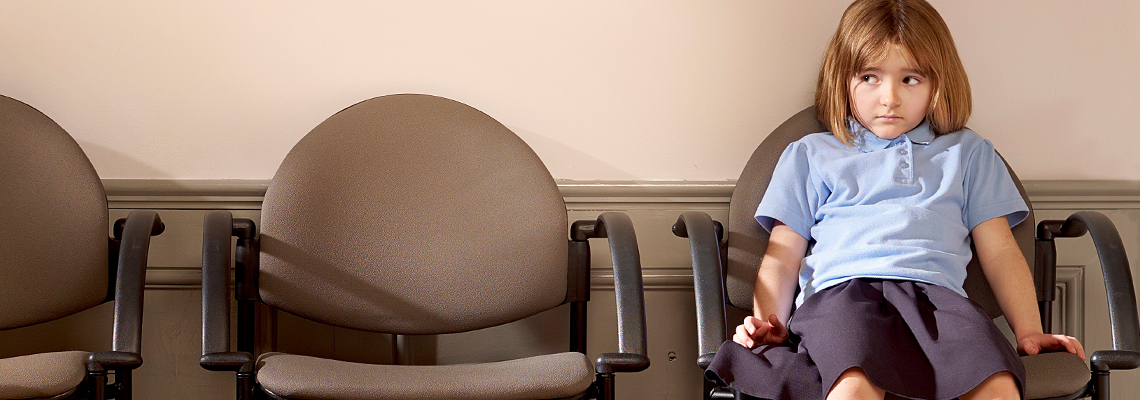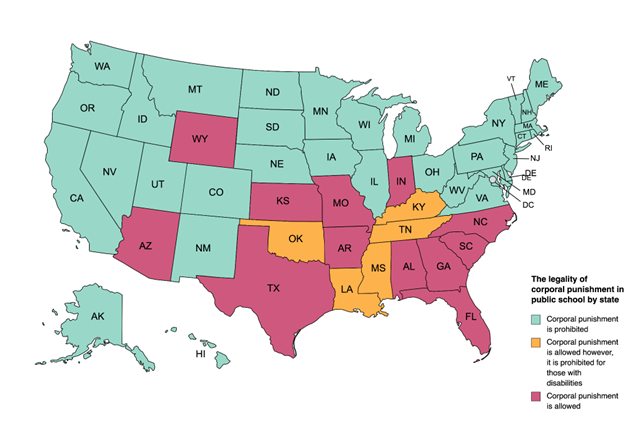
In 1977, the US Supreme Court ruled that corporal punishment could be used in schools. As of 2023, 17 states allow teachers to use corporal punishment as discipline. Corporal punishment is physical pain or discomfort to manage child misbehavior. The most common example of corporal punishment is spanking.
Examples of corporal punishment are:
- Slapping or hitting with a hand
- Spanking with an object (i.e., belt or paddle)
- Kicking or shaking a child
- Scratching or biting a child’s skin
- Forcing a child to stay in uncomfortable positions
- Confining a child in a small space
- Making a child exercise excessively
- Making a child hold a fixed posture for a long time
Many school districts often use spanking. In 2022, teachers spanked around 70,000 students. But, spanking may cause serious harm to a child’s mental and physical well-being.
Spanking may cause:
- Physical injury such as bruises, broken bones, or nerve damage.
- Mental health issues such as anxiety, depression, and low self-esteem
- Negative cognitive development and lower academic performance
- Less trust between the parent and the child
- Increased aggression and antisocial behavior
Why is corporal punishment ineffective?
- The relationship between teachers and students may be harmed.
- Students may disengage with school subjects.
- Children may withdraw and engage less in school activities, affecting their academic performance.
- Children may develop fear when interacting with their teachers, negatively impacting this relationship.
- Teachers use corporal punishment to change children’s behaviors. But, students who are getting this punishment might display more aggressive and antisocial behaviors.
The Effect of Corporal Punishment on Children with Disabilities
Corporal punishment is used more often with minorities, males, and children with disabilities. Students with disabilities are regularly targeted for exhibiting symptoms of their disabilities. For example, a child with autism may be punished for engaging in repetitive behaviors.
Children with disabilities more often have:
- increased risk of self-injury
- reluctance to return to school
- increased avoidance and aggressive behaviors
- developing post-traumatic stress disorder and experiencing severe distress
Prevention of Corporal Punishment
Corporal punishment may have long-lasting effects on children’s well-being. Children experiencing corporal punishment need a safe environment to recover. Thus, caregivers should respond and advocate for their child’s needs.
How to Respond as a Caregiver if Your Child Gets Spanked at School:
- Identify and avoid any words, actions, or items that could trigger your child.
- Provide emotional support to your child.
- Engage in shared, pleasurable activities together (e.g., painting, walking, and cooking).
- Make sure to use kind words to show love and comfort.
- Seek help from a mental health professional or use the resources below.
Promoting Advocacy:
- Reach out to a local Parent-Teacher Association (PTA) around your area. Ask for a copy of the school’s discipline code. This can notify you of any policies related to corporal punishment and how they might impact your child.
- There are two options to withdraw from corporal punishment. First, caregivers can sign an opt-out form to prevent corporal punishment. Second, caregivers can write a letter to the superintendent and school principal to prevent your child from punishment. Template found here.
- Write an email to the local elected officials in your state. In the letter, express concerns and ask for a ban on corporal punishment within your state.
Additional Resources:
Local Parent-Teacher Association (PTA)
National Suicide Prevention Lifeline at 800-273-TALK (8255)
World Health Organization. Corporal punishment and health. WHO. Published 2021. https://www.who.int/news-room/fact-sheets/detail/corporal-punishment-and-health#:~:text=On%20average%2C%2017%25%20of%20children
American Civil Liberties Union. Ten Steps Against Corporal Punishment. American Civil Liberties Union. Published August 10, 2009. Accessed October 5, 2023. https://www.aclu.org/documents/ten-steps-against-corporal-punishment
Proper Citation for this blog post:
Ogunmona, S., Wilson, K., & Chaves, E. (May 5, 2025). Is spanking an effective means of discipline in schools? https://infoaboutkids.org/blog/is-spanking-an-effective-means-of-discipline-in-schools

















